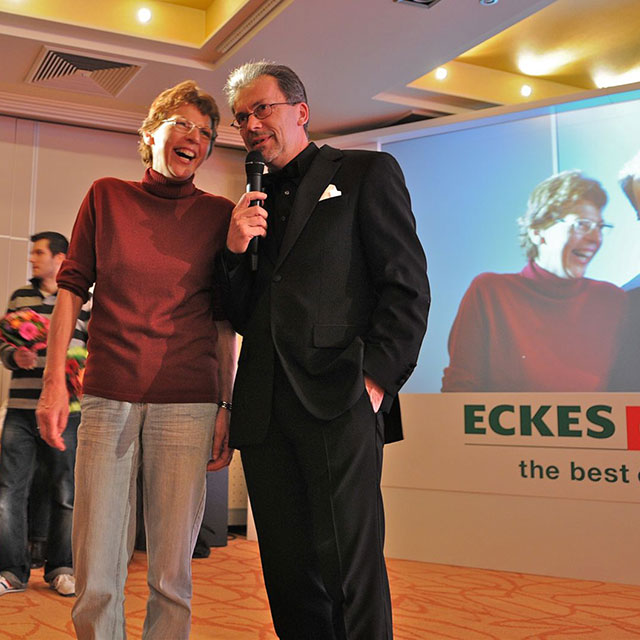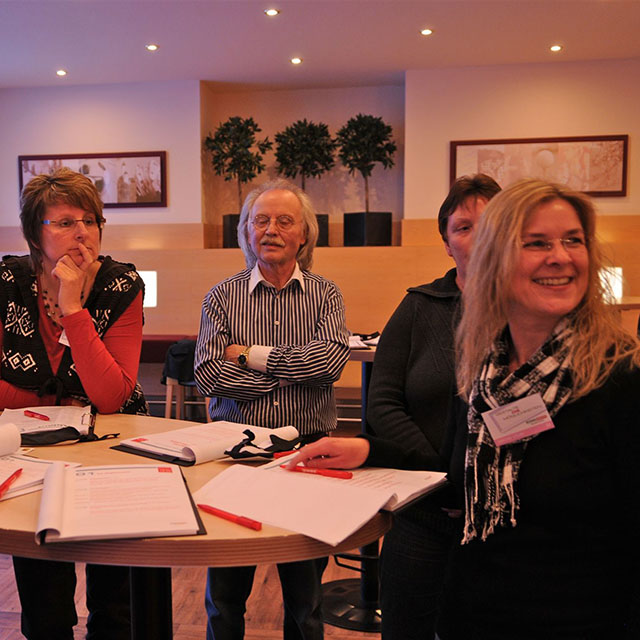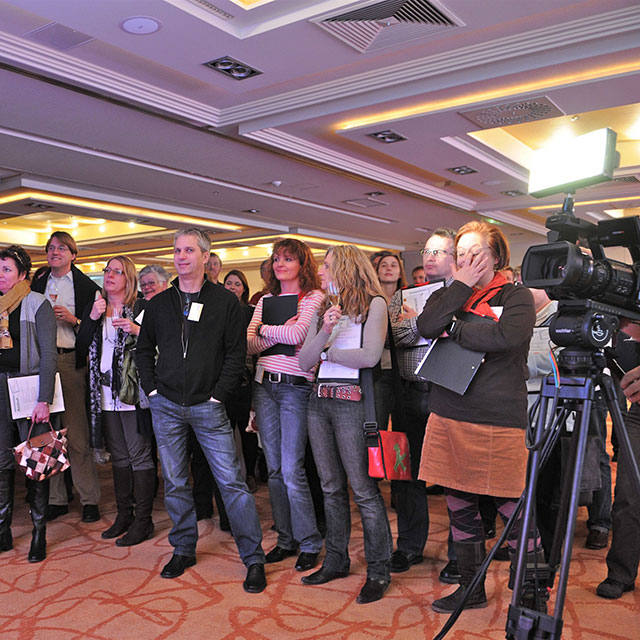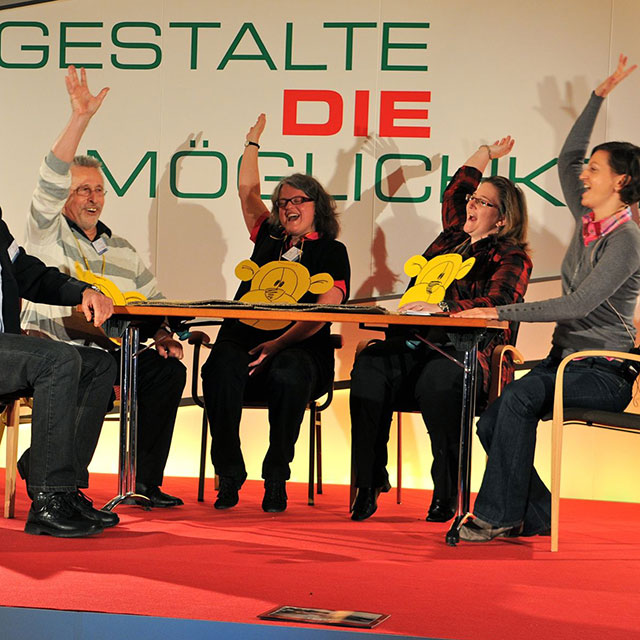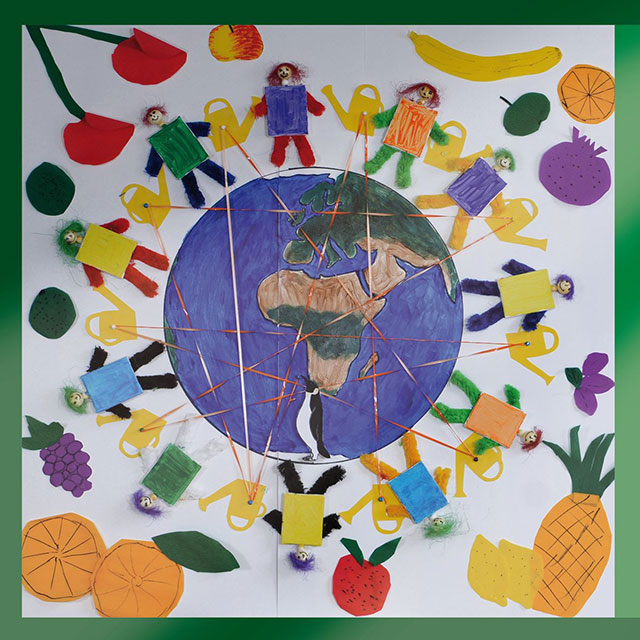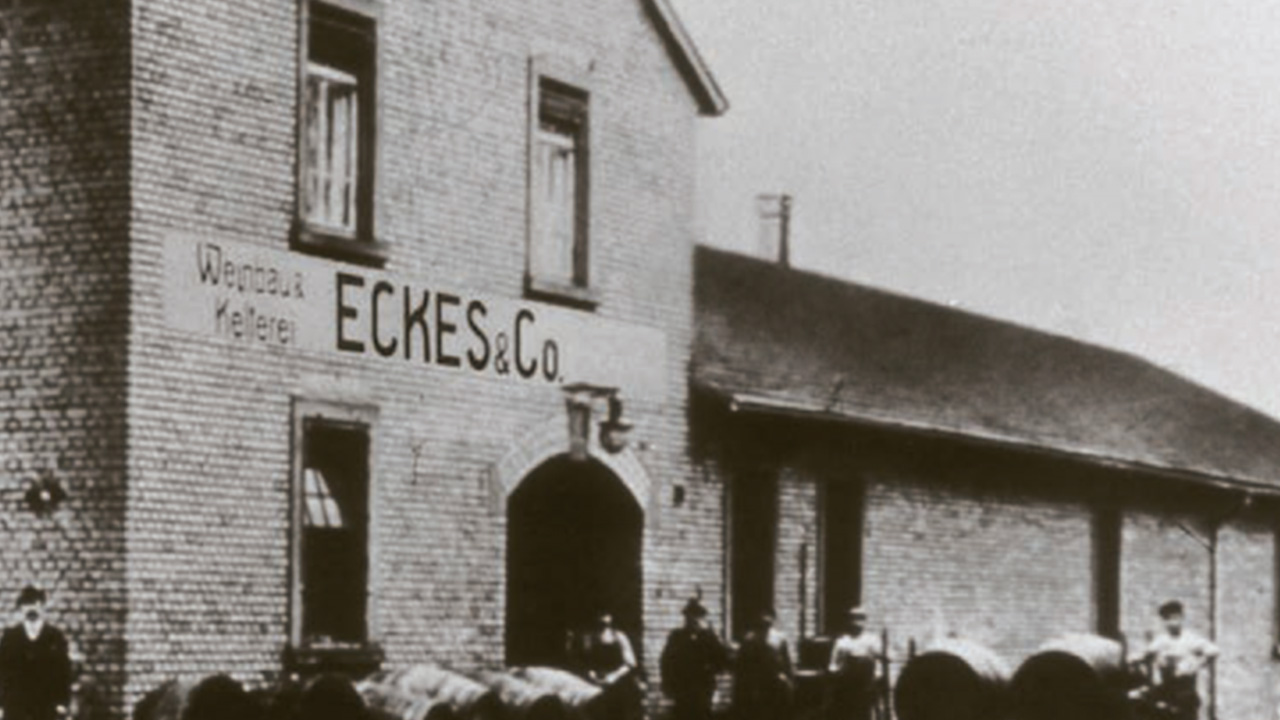Eckes-Granini Germany
At the end of the annual Eckes-Granini Germany kick-off event, when the boss came to his final words, two employees suddenly ran to the stage and snatched the microphone from him. “I think we should take the opportunity to express our gratefulness to our management because what they are doing here is not normal,” they shouted into the microphone. The rest of the staff joined in with loud applause.
Faith in the abilities of his team motivated the Eckes-Granini Germany boss to put strategies in the hands of many. That was at the beginning of the millennium. The CFO brings it to the point: “After all the freedom and trust you get for your contribution, you simply do not want to disappoint your manager. A very challenging type of management.”
Eckes-Granini Germany is a company that has managed a cultural change. The company invites its employees to become actively involved. The management maintains a culture of trust and includes staff even in difficult financial decisions. For example, in 2004 the interdisciplinary team decided on a high-risk investment of over 50 million Euros. Confidence in the skills of the workforce paid off. Investments guaranteed a substantial increase in sales and a significant competitive advantage—and, therefore, the long-term market leadership of the company.
A NEW LEADERSHIP
As the current Granini CEO, Heribert Gathof took over the leadership of the newly formed German Cooperation in 2000. He found himself in a financially challenging situation. Back then, the management of the group and the German business were located under one roof, meaning the overhead could be shared. After re-establishing the German Cooperation, this was no longer the case. Suddenly, Eckes-Granini Germany had a much greater cost to carry. “Our numbers were weak and we needed solutions to increase them,” said Gathof today.
As a former marketing director of the group, he valued “creative restlessness.” During his professional life he experienced the fact that sustainable solutions do not always come from above (the management); they come from all parts of the system. James Surowiecki’s book, “The Wisdom of Crowds,” in a way set Gathof on a path. So did the prevailing management style of the 80s and 90s. Gathof recalls: “Once again I had a bad feeling at a meeting of the functional representatives, signing off another unspoken nonaggression pact and calling that a ‘strategy.’“ He wanted to do things differently and organized secret meetings with colleagues who also wanted to make a lasting difference. Together, the team developed a thesis which described a strategic direction for the company. Only after its completion did Gathof confess to his former boss that he had secretly established a multidisciplinary strategy team.
The reaction: Instead of disciplinary measures, Gathof’s superior requested a meeting on “neutral ground” where the result was to be presented. The “unmasked” strategy team and the supervisors met in hired rooms at the Frankfurt Airport. After the meeting, Gathof knew without any doubt that strategy does not always come from the top. His boss had accepted more than eleven of the fifteen theses.
COLLECTIVE INTELLIGENCE
With this experience and the concept of “The Wisdom of Crowds,” Gathof took on the leadership of Eckes-Granini Germany in 2002, as it was transferred to him. After he assumed office, the company’s strategy was no longer determined solely by management, but was supported by a team which was composed of members from all sectors and all hierarchical levels of the company.
In 2000, 40 employees met for several workshops to determine “Where does Eckes-Granini stand in 2005?” From this purely strategic question, operationally workable answers emerged for the company. Following the recommendations of the strategy team, a change from glass bottles to PET bottles took place. Staff recognized the existential threat posed by the Container Deposit Legislation and recommended a switch to PET quickly. Following approval by the supervisory bodies, Eckes-Granini invested, over several stages, an expansion in the double-digit millions. After the introduction of PET bottles, sales soared by 70 percent.
Since 2000, the strategy team has continued to meet every two to three years and illuminates the alignment of Granini. In addition to “The Wisdom of Crowds,” all strategic directions are anchored in all departments to help the administration in the management of its employees. “Since the people have contributed to developing those strategies, they no longer need convincing,” says the boss.
TEAM SPIRIT
With this experience and the concept of “The Wisdom of Crowds,” Gathof took on the leadership of Eckes-Granini Germany in 2002, as it was transferred to him. After he assumed office, the company’s strategy was no longer determined solely by management, but was supported by a team which was composed of members from all sectors and all hierarchical levels of the company.
In 2000, 40 employees met for several workshops to determine “Where does Eckes-Granini stand in 2005?” From this purely strategic question, operationally workable answers emerged for the company. Following the recommendations of the strategy team, a change from glass bottles to PET bottles took place. Staff recognized the existential threat posed by the Container Deposit Legislation and recommended a switch to PET quickly. Following approval by the supervisory bodies, Eckes-Granini invested, over several stages, an expansion in the double-digit millions. After the introduction of PET bottles, sales soared by 70 percent.
Since 2000, the strategy team has continued to meet every two to three years and illuminates the alignment of Granini. In addition to “The Wisdom of Crowds,” all strategic directions are anchored in all departments to help the administration in the management of its employees. “Since the people have contributed to developing those stratTo develop a sense of community spirit among staff, Eckes-Granini has held an annual kick-off event for more than ten years. For two days, almost all employees stop their regular work and retreat. In the early years, an external agency was hired for the event. However, the feedback was mixed. “In retrospect, one can honestly say that sometimes we just went too far,” muses HR manager Norbert Enk. “We did receive some resistance from staff when we tried drumming and dancing with all personnel at the kick-off. Often it is a question of balance. On one hand, you have to push the boundaries to get ahead; on the other hand, you can’t push too hard.” By now, management is confident enough to implement those events with carefully selected external consultants. The concept is jointly developed in-house.
Now, the kick-offs are something almost all staff look forward to. At the kick-off event, everyone has the opportunity to behave in a way that’s different from how he or she would behave in the office. In this environment, employees can grow beyond themselves, which enables them to break new ground, even in their everyday lives.
These events can look very different. For example, one year the purchasing manager of a large retail chain visited the company. He told staff about the economic challenges of his own business and added information about what Eckes-Granini Germany as a supplier could do to be even more open for trading. Another time, a focus group of end users was invited. In front of all staff, they examined the new product and marketing ideas. Another highlight was the year when the general manager dressed up in tiger-patterned boots and hosted his own, exclusive Thomas Gottschalk version of “Wetten Dass.” Staff pulled a 40-ton truck loaded with juice across the production site.
EVERYDAY LIFE
Getting used to the open corporate culture took a while for many. “I experienced the German subsidiary as a critical counterpart while I was working in the organization’s headquarters. This could be tiring. It was easier for the other countries,” says Wolfgang Nickles, present Chief Financial Officer at Eckes-Granini Germany and, until 2008, head of controlling within the lead company. “Since I switched to the German subsidiary in 2008, I have learned that there is quite a different approach to staff, in particular between supervisors and employees. The employees understand the whole process as a responsibility, and changes are questioned critically. You have to convince them. Once this is done, or likewise, the boss has been convinced about another solution, it all goes smoother.”
“We have an open-ended approach,” explains marketing director Stefan Müller. “For colleagues with consolidation experience it is sometimes difficult. Employees who fill the allotted spaces assume responsibility and feel completely themselves. One needs to know how to deal with a certain closeness—it happens to be that in our company people are in the centre. Some don’t want or can’t do that. Those are the employees who quickly leave as well.”
One of the human resource challenges the company faces today is demographics – a voluntary employee turnover rate, which is less than three percent. “In three years, half of our employees are over 50 years old, an enormous pool of experience. These employees know under which conditions they want or do not want to work. Herein lays the importance of responding, if needed even individually,” says the head of personnel. “At the same time, however, we do think about how to get fresh ideas to the company by employing new staff. Whenever a workplace becomes available, we reemploy.”
Even today, Eckes-Granini is facing challenging times. High raw material prices are a serious challenge for the market leader. However, rather than draw the reins tighter, the management remains confident in the collective intelligence of its workforce. Even in these hard economic times, there is time and room for individuals to get involved.
COMPANY FACTS
The roots of Eckes-Granini go back to 1857 when the Nieder-Olm production company started the distribution of spirits. In 1933, the company added the first healthy fruit juice to its range, followed by the classic “High C” in 1958. In 1994 Eckes acquired the company Granini.
Today, the “juice bar,” as the company likes to call itself, has a market share of 16 percent in Germany. Annually, it sells more than 400 million liters of fruit juice and employs approximately 600 people. The German business unit is the largest of 14 national companies, which earns the family business a total of 900 million Euros in sales.
